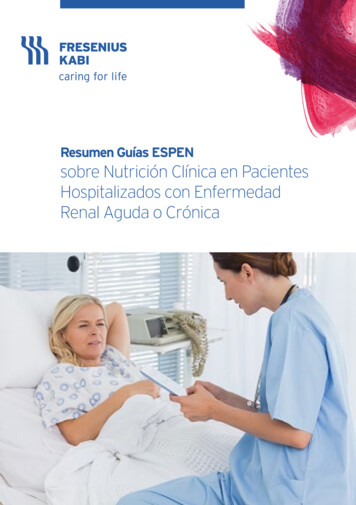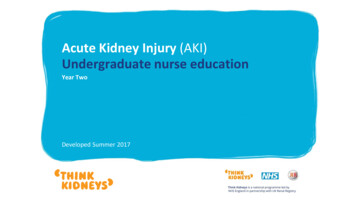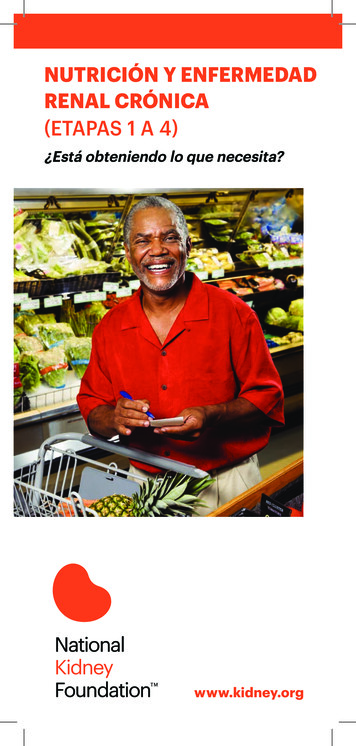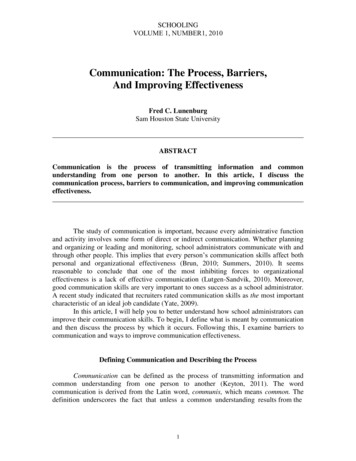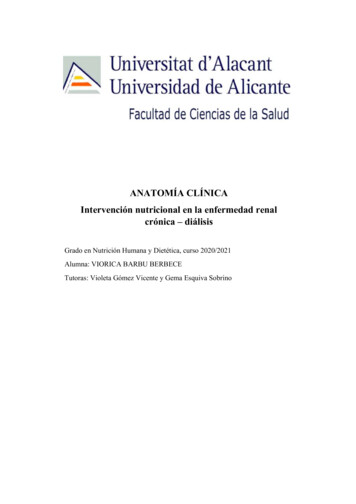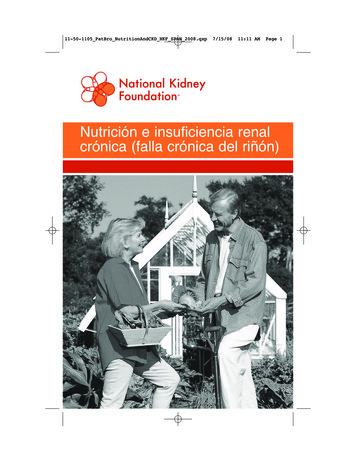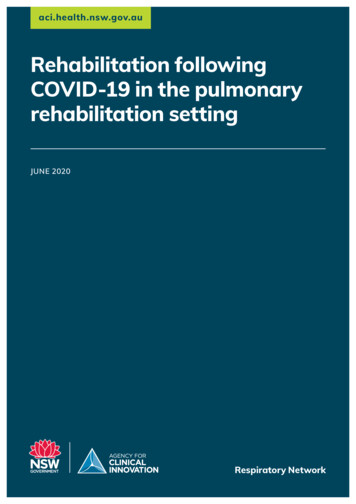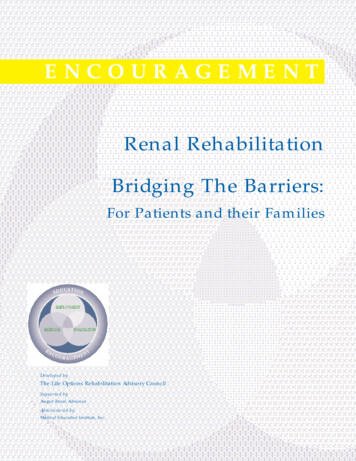
Transcription
ENCOURAGEMENTRenal RehabilitationBridging The Barriers:For Patients and their FamiliesDeveloped byThe Life Options Rehabilitation Advisory CouncilSupported byAmgen Renal AdvancesAdministered byMedical Education Institute, Inc.
Bridging the Barriers: For Patients and their Families was written for patients and their families to help them learn about dialysis and how it will affect their lives.This booklet is not intended as a substitute for medical counseling or legal or other professional advice, and should not be considered as such.Readers must recognize that some suggested activities, exercise in particular, involve certain risks, including the risk of severe injury, disability, or death.These risks cannot be completely eliminated even when done under expert supervision. Use of these materials indicates acknowledgment that Amgen Inc.,Medical Education Institute, Inc., and the Life Options Rehabilitation Advisory Council will not be responsible for any loss or injury sustained in connection with,or as a result of, the use of this booklet.In addition, readers must understand that this material may not address all issues of concern to you in light of your particular circumstances. Also, futurelegislation and court decisions may significantly change the current law or interpretation of current law. None of, Amgen Inc., Medical Education Institute, Inc.,or the Life Options Rehabilitation Advisory Council is under any obligation to update the materials contained within which are based on information available asof the date of publication.If medical, legal or other professional advice is required, please seek the personalized service of a competent professional. 1994, 1998, 2000 Amgen Inc. All rights reserved.
July, 1994nts:Dear Fellow Patierenale your interest inarshIseucabeud I’m aI’m writing to yoysis since 1970. AnaldionenbeeI’vrehabilitation.iled transplants.survivor of three fater startingturned to school afreI,ghouths,gentechnology.Despite these challeee in mechanicalgrdeeatcisoasengineeringdialysis and got any company’s toolmoferaganmeme settingEventually, I becaspending my timenbeeI’v,tlynceredepartment. Morer kidney patients.heotrlfomraogprtuncil. This CounciCorysoviAdup an employmenntioRehabilitale we haveof the Life Optionsrbeemmsd researchers. Whiituan,eresemtivtaanensoesdalprI’mking to identify aners, government reoridwove:prosrprepuca,tsonnve one commincludes patiening, all of us haaitrdansceenridifferent expethebilitation issues.called Bridgingrtporeaddress renal rehaercusoreat reporthabilitationed summary of thveloped a renal reardeeplprcinllyuiaCoecespth,aRecentlylet presentg pages of this bookinwllofoeTh.rsdisease.Barrieliving with renalrstobeemmilymThe Council refers.nioatlitbifor patients and fahareridges” to.t, and evaluations identified five “benhamlcioynpluemCo,esethcie,ercation, exAs you can secouragement, eduen:t out of lifes”E’“5ethasu can get the mosyosothese bridgess”E’“5eesch life with thw you can approahoilstadetleokThis boeyou can, with somatthednaron dialysis.leeI’val disease,working with rendanginlivalk.duAs an indivitter than you thinbedodanelifruof yoeffort, take controle not alone.Remember, you’rSincerely,Bruce LublinhabilitationDialysis PatientLife Options ReethofrbeemEmeritus McilAdvisory Coun1
Bridging the Barriers:For Patients and their FamiliesA Project ofThe Life Options Rehabilitation Advisory CouncilFunded byAn Educational Grant from Amgen Inc.Developed byMedical Education Institute, Inc.ADVISORY COUNCIL: MEMBERS AT LARGEChristopher Blagg, MDNorthwest Kidney CentersSeattle, WashingtonRichard Rettig, PhDInstitute of MedicineWashington, D.C.John Sadler, MDUniversity of MarylandBaltimore, MarylandAnn Compton,RN, MSNNorthwest Kidney CentersSeattle, WashingtonNancy Kutner, PhDEmory UniversityDepartment of Rehabilitation MedicineAtlanta, GeorgiaBruce LublinHartland, WisconsinTheodore Steinman, MDBeth Israel HospitalBoston, MassachusettsBeth Witten, ACSW, LSCSWJohnson County DialysisLenexa, KansasADVISORY COUNCIL: AMGEN REPRESENTATIVESAnthony Messana, BSCDialysis Clinic, Inc.Nashville, TennesseeKenneth Chen, MSSpero Moutsatsos, MSESRD Network of Florida, Inc.Tampa, FloridaMichael Savin, PhDJohn Newmann, PhD, MPHHealth Policy Research & Analysis, Inc.Reston, VirginiaEDITOR:Patricia Painter, PhDUCSF Transplant ServiceSan Francisco, CaliforniaSteve EssexDonna Mapes, DNSc, RNEDITORIAL TEAMEdith Oberley, MAWRITERS:Anne Morgan GirouxGeorge Porter, MDOregon Health Sciences UniversityPortland, Oregon2Paulette SackstederElizabeth SchumacherDorian Schatell, MS
TABLE OF CONTENTS1. Rehabilitation and You52. Encouragement Is Essential93. Education Is a Tool Everyone Can Use114. Exercise Keeps You Active135. Employment Can Be a Goal for You156. Evaluation Is the Basis for Knowledge197. Common Questions about Kidney Disease208. Working with Your Treatment Team239. Tips for Traveling2810. For Family Members: Your Role in Rehabilitation2911. Table of Contents of the Bridging the Barriers Report3312. Renal Rehabilitation Resources343
Medical Education Institute, Inc.414 D’Onofrio Drive, Suite 200Madison, WI 53719-2803(608) 833-8033 Medical Education Institute, Inc. 19944
REHABILITATION AND YOUEvery 12 minutes, more than 100 times a day, someone in the U.S. is toldthey have “end-stage renal disease.”Many of these new patients will fear that end-stage renal disease (ESRD)will mean the end stage of their lives. A few may even allow the illness to destroytheir hopes and dreams. Other patients, though, will keep doing the things thatare most important to them – like working, traveling, exercising, doing hobbies,and remaining active in family and community life.How much will your life change? That depends a lot on you. There arecountless patients who look at dialysis as a quiet time to read or relax, and thengo back to doing all the things they did before. It’s up to you how much you wantto keep your life the way it has been.It is very normal to be afraid at first, and worried about how your life willchange. You’re not alone. There are many, many people who can help you.Your dialysis team (doctor, nurse, dietitian, social worker and technician) is agood source of advice and help about rehabilitation.What is rehabilitation?Rehabilitation means restoring you to stable health, a positive outlook, andactivities you enjoy. Why do you need rehab? To help you feel better bothphysically and mentally, and live your life to the fullest.Recent breakthroughs in medicine and technology have made treatmentfor kidney failure more effective. Some of these advances include new medicinesand more efficient equipment. This means that now more than ever before,kidney patients have the potential to return to an active and productive life.The Life Options Advisory Council – a group of doctors, nurses, administrators, social workers, patients, researchers, and others – has been working onrenal rehabilitation. They wrote a report called Bridging the Barriers, to helpfocus national attention on rehabilitation issues.This booklet brings you key points from that report. It was written with patientsand their families in mind.Rehabilitation for kidney patients means a coordinated program of: Medical treatment Education Exercise Counseling DietThese pieces of the rehabilitation puzzle all work together. Rehabilitation canimprove your fitness and energy, increase your ability to work, and help you havea better life.5
What Goals Should You Set For Yourself?Some key rehabilitation goals for patients with kidney failure include: A good understanding of how to live well with dialysis Taking part in your own treatment as much as possible Better fitness Getting back to the activities you enjoyed before kidney disease Employment, if you are able to workAsk yourself, “What is my dream?” It may help to write down your majorgoals. Break them down into action steps. And put the list where you can see itevery day.Do Renal Patients Work?Kidney failure affects people of every age, race, and walk of life. Yet, as a group,the nearly 200,000 renal patients are somewhat different from the whole U.S.population. Here are some interesting facts: In 1992, 42 percent of the ESRD population was over the age of 60, up from 32percent in 1978. About half of kidney patients are within working age. Many have at least ahigh school diploma and the physical ability to work. Only about 25 percent of dialysis patients are working now. But many more saythey are able to work! The number of working renal patients could probably bedoubled, according to recent studies. Many kidney patients want to work and have important contributions to make.Our nation can’t afford to waste their unique talents!You need to know that if you leave school or your job, it may be hard toreturn. As a dialysis patient, it’s important that your treatment team (doctor,nurse, social worker, etc.) continuously look at how you can work together toimprove your ability to work. This will help ensure the right rehabilitation effortsfor you.6
Does Rehabilitation Mean More Than Working?Yes. When possible, work is an important goal to help rehabilitate patients withkidney failure. But there’s more to rehabilitation than working. Also importantare motivation, education, and improving the quality of your life.Some patients can be encouraged to do recreational activities such asclasses, hobbies, or travel. Some need physical and occupational therapy toincrease strength and endurance. Others would be helped by counseling in peergroups or by professionals to help them adjust to renal disease.All patients and their familiesneed ongoing education. When it’spossible, you can even start learningwhat to expect before you begin dialysis.It’s a real plus to know the facts aboutyour disease, types of treatment, diet,and what to expect in your personal andfamily life. Education and better physicalfitness are rehabilitation goals for allpatients with kidney failure.Obstacles You CanOvercomeIf you’re a new kidney patient, youprobably don’t know what to expectfrom life on dialysis. If you’ve been ondialysis for a while, you may wish thatyou had known some things a lot earlier.Many obstacles to rehabilitation, likepoor attitudes, not enough information,and lack of exercise can be overcome ifyou learn about them early and knowwhat to do.BRIDGES TO REHAB: THE “FIVE E’S”The obstacles we talked about arechallenges for many patients. To helppatients overcome these barriers andlive better lives, the Council has namedfive “bridges,” or five “E’s:” Encouragement. A positive attitude is one key to a goodlife – with or without kidney failure. Working hard forsomething and taking control of your life gives you a senseof purpose. Education. The more you can learn about your illness andits treatment, the better you will be able to manage it. Exercise. Regular exercise can improve your fitness,give you more energy, and make your general health andoutlook better. Employment. If possible, don’t quit your job! A jobgives you self-esteem, identity, independence, a sense ofaccomplishment, a social outlet, and a higher standard ofliving. If you can’t keep your job, you and your social workerneed to look at programs that can help you retrain or find adifferent job.Attitudes can help – or harm Evaluation. Research is being done all across the countryAttitudes are very important. At someon ways to support rehabilitation, and to help you live apoint, you may meet people who havefuller life.negative attitudes about kidney disease.They may not support your desire to remain an active person. These feelings canbe contagious and harmful. Feeling depressed or less than whole makes it veryhard to look for a job, exercise, or even enjoy a favorite activity.7
It is normal to be scared and depressed at first. It is normal to feel that yourbody let you down, and even to think, “Why me?” Learning all you can andtalking to people will help you overcome those feelings. Kidney failure is onlyone fact about you. The rest of you is still the same.Many people with renal disease who receive proper treatment can enjoymany of the same activities they enjoyed prior to their renal failure. The singlemost important thing you can do is decide that you will keep doing what youlove – whatever that is.Adequate dialysis is a mustBesides having a positive frame of mind, getting enough dialysis is alsoimportant to your well-being. Dialysis must do the work of your kidneys whichnormally worked 24 hours a day. Every minute of dialysis is important, and moreis better. If you don’t get adequate dialysis, you won’t have the energy to do thethings you enjoy. Ask your treatment team about your dialysis prescription.Be informedBe an informed patient and healthcare consumer. Learn all you can and askquestions. Knowing about your disease and working together with your doctorallows you to take some control over your life with kidney disease.Keep fit – and you’ll have more energyHave you ever heard of “use it or lose it?” Patients with kidney failure don’t knowwhat activities they can safely do so they do nothing and their muscles get weak.Then they feel tired, and they don’t want to do anything physical. It’s a cycle thatyou can prevent. Ask your doctor what activities you can do safely. You willprobably be surprised to find out all that you can do. Exercise actually gives youenergy. To keep your muscles strong and your energy up, stay active. If you werenever active before, now is the best time to start.The following pages explain how you can use the rehab “E’s” tomake the most of life on dialysis.8
ENCOURAGEMENT IS ESSENTIALIt’s important for new patients to know that you can keep doing thingsthat are important to you. Talking to someone who knows how muchkidney patients can do can be very helpful. This is what we mean by encouragement. We hope you will have the chance to talk to someone who can encourageyou to learn as much as you can and to work hard to keep your life the way youwant it. You must believe in this, too.Kidney disease can turn your life upside down. It canbe very easy to give up and let other people take care of you.If you rely on everyone else, it can be hard to take control ofyour life again. That’s why it’s critical for you take responsibility for your own health right from the start.A key part of that responsibility is for you to exercise,learn about kidney failure and its treatment, and follow yourtreatment plan of good dialysis, diet, and exercise. Nobodycan “rehabilitate” you if you aren’t interested. You have towant it yourself.Adjusting to kidney failure and finally accepting it cantake time. It is quite a blow to learn that you’ll need lifelongtreatment because your kidneys no longer work. Even if youknew it would happen, it can be difficult to cope. Manypatients go through several stages of getting used to the idea.Denial is usually the first phase. Patients may refuse toaccept that they are ill. It is very important to follow the dietand fluid plan, and take the medications your doctorprescribes for you. If you deny that you have kidney failureand don’t follow your treatment plan, dialysis will be evenmore of a shock to your system.“I thought I would never smile again,that I would never stop thinking aboutmy misery and my unfair fate.I have gained spiritual strength.Though physically I am more frail,I am actually stronger than before.Working through all my physical andemotional problems with dialysis andhaving been so close to death,now I know what’s really important in life.Now I am really living.”Anonymous patient quoteA later phase of adjustment is discouragement, or depression. Patients mayfeel hopeless, or that life isn’t worth living because it isn’t the same. Others maybe angry at their bodies for letting them down, at themselves for not followingthe doctor’s orders earlier, or even at God for letting this bad thing happen tothem. It just doesn’t seem fair.Patients adjusting to kidney failure also have to face their fears of thetreatment itself, and their fear of dying. It’s a lot to deal with. At a time like this,a helpful way for people to lessen their fears and learn to cope is to talk aboutwhat is happening.9
Your nurse, social worker, dietitian, technician, or nephrologist can answermany of your questions. They can talk to you and your family together. They canhelp teach you what to expect and how you can keep your health as good as itcan be. They can encourage you to do things for yourself and learn as much aspossible.You can also talk to your family, your friends, your religious advisor, or acounselor about the change in your life. Other transplant and dialysis patientsmay be helpful too. If you can voice some of your feelings and face your fears,you’ll begin to feel better.It is normal to grieve for what you’ve lost. But you may find one day thatyou are living life with new appreciation and awareness.Lillyif theye patients talk withavhonptomCnShe hasWho does nurse Anliving on dialysis?touabsrncencot Lilly Robinsonhave any fears orentipassilyiaodemold ho,”them meet 86-yearn do it, you can, tocaIifatthemthlltewouldwho lives alone. “IIf I had given up Iy.trisdotoeavhsays Lilly. “All youing home.”have been in a nursysises a week at a dialmtiereth,rsouheysisLilly dialyzes three has been on dialSh.iainrgVid,oncenter in Richmsince 1991.to keepher dialysis centerintsentipagnks,giBesides encourae walks 4 or 5 blocSh.secierexoftlots aysistrying, Lilly also geBefore starting diald.onmhicRnwtonwtwice a week in dok.Lilly felt very weasend on somebody elpede’tndo,eslvsead to bets to do for themdney disease, she hkidpe“I tell other patienlovedeyllLi71. “ItLong before) had a stroke in 1989to do everything.”19ineddioh(wusbandI didn’t give up.”.ownemindependent. Her hatokloout and do. Andwas up to me to go10
EDUCATION IS A TOOL EVERYONE CAN USEOne of the hardest things to do when you know you have a medicalproblem may be to learn more about it. But even though you may havemany frightening questions, you may find comfort in knowing the answers.Learning about your disease and its treatment puts you in charge.Education helps you understand the “why” behind your treatment. After all, eventhough your nephrologist (kidney specialist) knows more about kidney diseasethan you do, you are the expert about you.Patients with kidney failure who learn as much as they can, make sure thatthey get enough dialysis, and take the right medications at the right time, canavoid health problems later.Patients often do best if they learn about their treatment and take an activepart in the dialysis itself. In many facilities, patients learn to weigh themselves,take their own blood pressure and temperature, and assist with other aspects ofthe dialysis.It can be easy to sit back and let the dialysis staff take care of you. Buteducation helps patients like you take control of their treatments and their lives.Taking part in rehabilitation activities that are offered is another important partof learning how to live well with kidney failure.There is a lot for you to learn about ESRD and dialysis. It may seem overwhelming, but you don’t have to learn everything in one day or even one month.Through education you can find answers to questions like: How do I talk about kidney failure with my family? How do I talk about kidney failure with my boss? What’s the best treatment for me? How can I eat better? How do I start a safe exercise program? How do other patients cope with kidney disease? How can I share what I’ve learned with other patients?Have you been on dialysis a long time? You may be surprised to know thatthere are things you need to learn too – like the newest technology, medicine,and rehabilitation efforts.11
Your facility may have pamphlets, videos, and booklets to help both new andongoing patients. A handy list of resources can be found on page 34.Charliehis experience as asseuaidorFl,paof TamtCharlie Rodriguezother patients aboutecauedtotentiey paRenalnineteen-year kidncoordinator of theethis,40e,liarhthefinding new jobs. Cram sponsored byogprewna,amgrEmployment ProFlorida.on and the State oftilioaCalenRaidFlorbs,n about finding joarletsentipapelhlthe patient is suitedThe program wilatthseroyplemhts witl“connecting patienis made aware of aleroyplemethe,liharatedto.” According to Cd health are integranisysaldiatthsothe patient’s needsle.into the job schedumentents about employtipaeydnkitecaurience, but also hisCharlie’s need to edpeexalonrspenly his owstems from not onpatient advocate,aasceenripeexkworandextensive volunteereaker with the NKFsponticauedicblher ESRDairman, and pues and educates ototompatient services chprehathwng proof ofAAKP. Charlie is livi:00-5:00patients about.owed by working 10llfoisysaldiamys,s with 5:30esdays and Thursda ingTuHis schedule beginnOs.ayidFrd“managesdays, anon Mondays, Wednkey to his success isethyssaeli,arhCtime.t from his wife, sonorppsuCharlie works fullaslelwasercise well,”dialysis, diet, and exand doctors.ing changed mybelelwltaenmde, “Physical anyears for me to faceerethAccording to CharlioktoIt.vetibe partative to posiachine-it’s going tomoutlook froma negisthhitwkorwhave tokidney failure. Youof your life.”12
EXERCISE KEEPS YOU ACTIVESurprisingly, many patients – and even many health professionals – don’tyet know that exercise is important for patients with kidney disease. Thereis plenty of evidence now that shows that people on dialysis can benefit fromregular exercise.Wastes that build up between dialysis treatments and lack of exercise maylead to loss of muscle mass and tone. Mild exercise is one of the first rehabilitation tasks a patient can begin that will help both the body and the mind.Regular exercise can also help you sleep better, reduce depression andanxiety, fight anemia (low red blood cell count), and strengthenyour bones and muscles. It also helps control your blood pressureand reduce your risk of heart disease.Keeping up with the activities you want to do takes energy,flexibility, strength, and endurance. Whether it’s dancing to musicaround the house, playing catch with a child, walking through themall, planting flowers in the garden, cleaning the house, or walkingto a friend’s house . the fact is, you need exercise.Exercise doesn’t just happen. It requires active participation onyour part. There are many levels of activity to fit different levels ofability – from a vigorous workout to walking around the block tostretching exercises.Exercise physiologist Patricia Painter, PhD, has somesuggestions for putting together an exercise program. Your programshould include:“I’ve always felt the best on dialysiswhen I was exercising.I can’t stress the importance ofkeeping active.Not only does it help you physicallybut it really helps your sense ofconfidence, your self worth.”Steve Coons, on dialysis since 1978 Flexibility Exercise – such as gentle stretching of your arms, legs, neck,and back Endurance Exercise – such as walking, bicycling, swimming, etc. Strengthening Exercise – lifting small weights at first (like one-poundcans of food) and building up to more repetitions or slightly heavier weights.The key is to start slowly, move gently, and if anything hurts, stop.Stretching before you exercise helps warm up your muscles and prevent injury.Exercise should be done regularly – at least 3 times a week. Get together withother patients at your facility, your family or friends and start a walking club. Itcan also be an enjoyable social outlet and give you a sense of accomplishment.13
Herbom thed dialysis patient frantisicysphdbolreaa biotech firm, HerhitwHerb Davis is a 57-yrteriwalicnA.area. A techchers studying DNarSan Francisco Baysererfosaluanftware mwrites computer sok, byexercises each weeohwtentipaisysaying racquetballpldHerb, a 3-year dialan,gayog,inftweight litestedtreadmill walking,ricia Painter, PhD,atPstgiloioysphercisene onregularly. Renal exysical shape of anyophstbeethinse’“HDr. Painter helpedesevHerb’s fitness level.libeberH.ysen,” she sanal – I think she’siodialysis I’ve ever seatirspinryveisens. “Shraise his expectatioyself.”tientshelped me push mhe charges other padan,highryvens remaitions andHerb’s expectationn. Ask a lot of quescauyoaschumo asto: “Keep active. Dht answers.”expect to get straigMedication Helps Anemia, FitnessYears ago, dialysis patients needed blood transfusions to help treat anemia(a shortage of red blood cells) which made them tired and weak. The anemiawas caused by a lack of a hormone called erythropoietin that tells the bonemarrow to make new red blood cells. These days, anemia is treated with asynthetic form of erythropoietin (often called EPO).Studies of patients receiving EPO have shown that they feel much better.They have more energy to do exercise, leading to better aerobic fitness andmuscle strength. In fact, the studies show that patients on EPO feel they have abetter overall quality of life.Two good sources of information for starting your exercise program areavailable. A brochure, Fitness after Kidney Failure, is available from theNational Kidney Foundation by writing to NKF, 30 East 33rd Street, New York, NY10016. A new fitness book for older adults, Pep Up Your Life, is available bywriting to the American Association of Retired Persons and President’s Councilon Fitness, at 601 E Street NW, Washington, DC 20049.14
EMPLOYMENT CAN BE A GOAL FOR YOUFinding, changing, or keeping a job may be one of the first challengesfaced by kidney patients who are of working age. If you’re working, it’svery important to keep your job if you can, especially if it comes with healthinsurance.Don’t jump into a decision about your job until your body has had achance to get used to dialysis. At first you may feel tired and out of sorts. After afew weeks or so, you’ll begin to adjust to the treatments, and then you can decidewhat to do.Instead of quitting your job right away, talk to your dialysisteam. Tell your doctor how you feel now, and ask him or her howsoon you’ll feel more normal again. If you want to keep your job,ask your social worker how you can talk to your boss about thisissue. Taking sick time, vacation time, or a temporary leave ofabsence can buy you some time to think about your plans. Youmay even be able to work part time for a while or switch to adifferent shift or job.“It’s very important to have someactivity that’s meaningful to yououtside the home.Employment is one area where peoplecan get a lot of satisfactionWhat About Job Discrimination?because it gives a social outlet,If your job calls for a lot of heavy lifting or standing, you mayself-satisfaction, sense of identity, andneed to change job assignments. Maybe you could keep trackof inventory or do something else less physical. A law called theincreases their standard of living.”Americans with Disabilities Act (ADA) makes it illegal for employers to discriminate against people with disabilities who can doBruce Lublin, on dialysis since 1970the required work. The ADA requires employers to make minorchanges called “reasonable accommodations” so people withspecial health care needs can work. This law also forbids discrimination againstpeople with disabilities in transportation, and public accommodations likeschools, stores, libraries, and recreational facilities.You may not have thought of yourself as having a “disability,” and that’sgood. You should know that this law was passed to help people who have adisability or who are thought of as having one. Even though you don’t think ofkidney failure as a disability, other people (like your boss) might.The kinds of accommodations most ESRD patients need are reasonable.More frequent breaks, a chair to sit in, a place to do CAPD exchanges, andflexible scheduling to work around dialysis are some ideas. The ADA protects youif your employer has more than 25 employees. Your social worker can call yourstate department of vocational rehabilitation to help you get more education orretraining if you need to change jobs.15
Johnre consumers andcahlteahbetodeed life schedule,Kidney patients nankorwalmornrto theiintegrate dialysis inSmith.according to Johnis a fullialysis patient whoodemhrea-y11ansit inJohn , 39, is anreater Richmond TrGethrfoerivdrstime city bu.Richmond, Virginia30 am dialysis at a1:-1007:hitwleuedJohn begins his sche and work.” Johnomhtoselo“cisn saysdialysis center thatpm-12:30 am. Joh004:omfrerivdrworks as a bushis needs. “I madeofvetiorppsuisployertthat his 5-year emI’d give 100 percen–eraganMelnnersoort.”a promise to the Pe 100 percent suppmvegildouwynealtheffort if the compa“except for a few hk,orwsseismlyreJohn says he rated to work.problems” not relahavelth care. “Patientseahhitwtenemlvotesrsonal invoneeds.” John promalJohn emphasizes peicogolhycpsdrities, anbetweendifferent needs, prioorking relationship-wcoadan,ard,”recaealthe odds across the bothedefi“individualized” h“dashehworkedian. John sayslth. He has alwayseahpatient and physicishhitwedlvtively invocruits and attendsrelyvetiacdbecause his is so acan,ntteras an 8-year old soared you are, the beepprerttwhile on dialysis, hbeeh“Ttitude, youctor workshops.NKF patient and do to a chronic disease with a negative atgo inl.”off you are. If yout to beat it, you wilanwuyoIf.itatbewon’t16
If you feel you are being discriminated against for a job or promotionbecause of your kidney failure or other disability, the Equal EmploymentOpportunities Commission (EEOC) will look into your claim and protect youagainst retaliation for filing a charge. To report a violation of the ADA or to getmore information, you can call the EEOC, toll-free at 1-800-USA-EEOC. Yourstate may also have laws to forbid job discrimination. Look in your phone book’sGovernment section for a Human Rights or Civil Rights agency to call.Scheduling Dialysis Around Your WorkIf you are working and want to keep working, there are two thingsyou can do about your dial
renal rehabilitation. They wrote a report called Bridging the Barriers, to help focus national attention on rehabilitation issues. This booklet brings you key points from that report. It was written with patients and their families in mind. Rehabilitation for kidney patients means a coordinated program of: Medical treatment Education .


